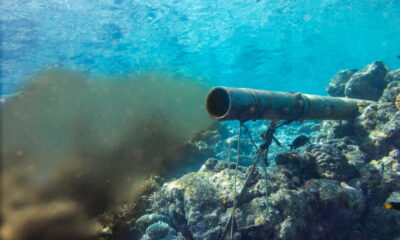

Environment
Banned pesticides highly likely to cause bee colony collapse, says Harvard study
The widely used neonicotinoid pesticides, three of which are currently banned in the EU, are a crucial factor in the collapse of US bee colonies, according to a new study led by the Harvard School of Public Health.
Researchers studied 18 bee colonies in Massachusetts from October 2012 until April 2013, and observed that those exposed to the chemicals faced colony collapse disorder (CCD), which affects bees’ immune system. Those untreated remained healthy.
Lead researcher Chensheng Lu said, “We demonstrated that neonicotinoids are highly likely to be responsible for triggering colony collapse disorder in honeybee hives that were healthy prior to the arrival of winter.”
The Harvard study observed, “Honeybee colonies in both control and neonicotinoid-treated groups progressed almost identically and observed no acute morbidity or mortality in either group until the arrival of winter.
“As temperatures began to decrease in late October 2012, we observed a steady decrease of bee cluster size in both control and neonicotinoid-treated colonies. While such decline was quickly reversed in the control colonies in January 2013, the neonicotinoid-treated hives continued to decline”.
The European commission decided to ban three neonicotinoids in December for two years, in order to put an end to the decline in bee numbers that has occurred throughout the continent, especially in northern Europe.
Commenting on the Harvard research, Friends of the Earth’s senior nature campaigner Paul de Zylva said, “Comprehensive research into the role pesticides play in bee decline is urgently required – including how they may compound other pressures, such as a lack of food and loss of habitat.
“The UK government has accepted the need for a national action plan to reverse bee and pollinator decline. But its draft plan is dangerously complacent on pesticides, placing far too much trust in chemical firms and flawed procedures.
“If the UK National Pollinator Strategy is to be a success it must turn the current rising curve of pesticide use in the UK into a downward arrow.”
Photo: James Patrick Casey via flickr
Further reading:
Bee Coalition: EU pesticide ban must be fully enforced to save pollinators
EU ban on bee-harmful pesticides to begin in December
Quarter of European bumblebees face extinction
Biodiversity in UK overseas territories face ‘immediate and significant threats’
UK and northern Europe among worst EU regions for honeybee deaths


 Environment11 months ago
Environment11 months agoAre Polymer Banknotes: an Eco-Friendly Trend or a Groundswell?

 Features10 months ago
Features10 months agoEco-Friendly Cryptocurrencies: Sustainable Investment Choices

 Features11 months ago
Features11 months agoEco-Friendly Crypto Traders Must Find the Right Exchange

 Energy10 months ago
Energy10 months agoThe Growing Role of Solar Panels in Ireland’s Energy Future





























